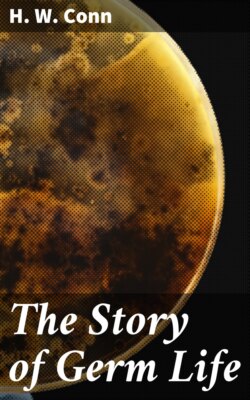Читать книгу The Story of Germ Life - H. W. Conn - Страница 15
На сайте Литреса книга снята с продажи.
RAPIDITY OF MULTIPLICATION.
ОглавлениеIt is this power of multiplication by division that makes bacteria agents of such significance. Their minute size would make them harmless enough if it were not for an extraordinary power of multiplication. This power of growth and division is almost incredible. Some of the species which have been carefully watched under the microscope have been found under favourable conditions to grow so rapidly as to divide every half hour, or even less. The number of offspring that would result in the course of twenty-four hours at this rate is of course easily computed. In one day each bacterium would produce over 16,500,000 descendants, and in two days about 281,500,000,000. It has been further calculated that these 281,500,000,000 would form about a solid pint of bacteria and weigh about a pound. At the end of the third day the total descendants would amount to 47,000,000,000,000, and would weigh about 16,000,000 pounds. Of course these numbers have no significance, for they are never actual or even possible numbers. Long before the offspring reach even into the millions their rate of multiplication is checked either by lack of food or by the accumulation of their own excreted products, which are injurious to them. But the figures do have interest since they show faintly what an unlimited power of multiplication these organisms have, and thus show us that in dealing with bacteria we are dealing with forces of almost infinite extent.
This wonderful power of growth is chiefly due to the fact that bacteria feed upon food which is highly organized and already in condition for absorption. Most plants must manufacture their own foods out of simpler substances, like carbonic dioxide (Co2) and water, but bacteria, as a rule, feed upon complex organic material already prepared by the previous life of plants or animals. For this reason they can grow faster than other plants. Not being obliged to make their own foods like most plants, nor to search for it like animals, but living in its midst, their rapidity of growth and multiplication is limited only by their power to seize and assimilate this food. As they grow in such masses of food, they cause certain chemical changes to take place in it, changes doubtless directly connected with their use of the material as food. Recognising that they do cause chemical changes in food material, and remembering this marvellous power of growth, we are prepared to believe them capable of producing changes wherever they get a foothold and begin to grow. Their power of feeding upon complex organic food and producing chemical changes therein, together with their marvellous power of assimilating this material as food, make them agents in Nature of extreme importance.
